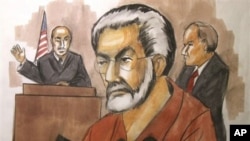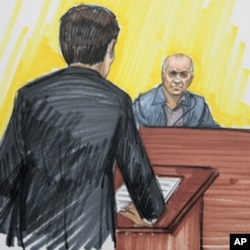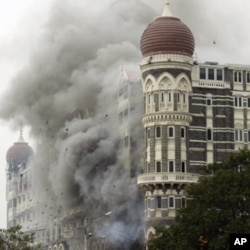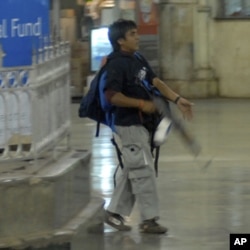The U.S. government’s star witness in a high-profile terrorism trial involving the 2008 bombings in Mumbai, India is on the stand this week in Chicago, Illinois. Pakistani-American and admitted terrorist David Headley has offered jurors an inside look at what he describes as the close relationship between members of Pakistan's intelligence agency and militant groups, and how it lead to the three-day siege that killed 166 people.
Headley told jurors that Pakistan’s Inter-Services Intelligence agency (ISI) serves as “an umbrella group” for Lashkar-e-Taiba (LeT), the militant group accused in the attacks, and other terrorist cells. He said the ISI also provides financial support and training for militants in Pakistan.
Headley is testifying in the trial of Tahawwur Rana, a Pakistani-Canadian and long-time Chicago resident accused of helping plan the Mumbai siege. Prosecutors say Rana allowed Headley to pose as an executive with his immigration business as a cover while Headley scouted targets in Mumbai.
|
Analysts Jason Campbell and Moeed Yusuf speak to credibility of David Headley
|
Rana has pleaded innocent, and his lawyers say he had no knowledge that Headley was going to Mumbai to plot attacks.
The trial comes less than a month after U.S. forces found and killed al-Qaida leader Osama bin Laden in the Pakistani garrison town of Abbottabad, which heightened suspicions in the U.S. that Pakistani officials were complicit in sheltering the terrorist.
Islamabad has admitted the Mumbai attacks were partially planned on Pakistani soil, but it has repeatedly denied any government involvement.
Headley told a jury of eight women and four men in the trial that began last week that an ISI officer offered him funds to scout targets in Mumbai and eventually choose the Jewish center attacked there in November 2008.
Headley said the officer, identified only as “Major Iqbal,” then turned his focus on a plot to attack the Danish newspaper Morgenavisen Jyllands-Posten, which ran a controversial cartoon of the Prophet Mohammed in 2005. Headley also told jurors he was pleased with the three-day siege on India’s financial capital.
|
Listen to Sarah Williams' Interview with VOA Urdu reporter Aisha Tanzeem, who has been attending the trial in Chicago.
|
Tense U.S.-Pakistani Relations
The United States and its allies have questioned for years whether the ISI has supported and collaborated with terrorist groups, like LeT and the Taliban. The revelation that bin Laden was living steps from a Pakistani military academy has renewed concerns about the complicity of some Pakistani officials in terrorist activities.
Jason Campbell, an analyst for the U.S.-based policy group the RAND Corporation, said evidence introduced in the Chicago trial shows it is unlikely top ISI officials were involved in the Mumbai bombings. But he said Headley’s testimony shines a light on how entwined the agency is with Pakistani militants.
“He is saying it in a way that is making it clear the connections with the ISI and the LeT are very much formalized and pretty pervasive throughout the organization,” said Campbell.
|
Listen to Ira Mellman's interview with Seth Jones from the RAND Corporation, who says the allegations against Pakistan's spy agency could create another rift between Washington and Islamabad.
|
The trial is expected to complicate the already fragile ties between Washington and Islamabad. But Moeed Yusuf, the South Asia advisor for the U.S. Institute of Peace in Washington, said Headley's testimony will not have a lasting impact on relations.
“I think the relationship between the U.S. and Pakistan is so critical, and the issue of Afghanistan is so overbearingly important for the U.S., that I don’t see any rupture in the relationship or any efforts to create a further divide just because of this testimony,” he said.
The India Equation
Yusuf said this case also complicates the tense relationship between Pakistan and neighboring India. New Delhi quickly blamed Pakistan-based militants for the Mumbai assault. Yusuf said any revelations during Headley’s testimony could have a significant effect on the weak, drawn-out peace process between the two nuclear-armed nations that centers on the disputed region of Kashmir.
“It’s absolutely disastrous because these two countries are just getting back to the table and finding ways to reinvigorate their peace process and move forward towards normalization,” said Yusuf.
Prosecutors are expected to press Headley this week for more details on the plot against the Danish newspaper before wrapping up their case and allowing Rana’s defense team to begin its cross-examination. Rana’s lawyers have questioned Headley’s credibility, citing his history of multiple wives and drug trafficking.
Headley worked as an informant for the U.S. Drug Enforcement Administration after a drug trafficking conviction. He agreed to testify against his longtime friend as part of a plea bargain to avoid the death penalty. Six others are indicted in the case, but remain at large. If convicted, Rana faces life in prison.


















